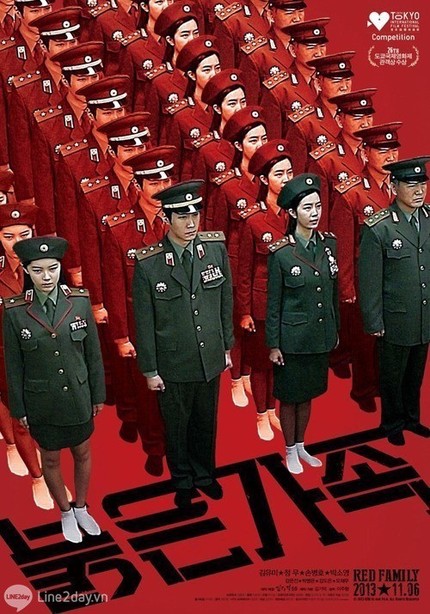Review: RED FAMILY's High Concept Suffers From Stilted Delivery

Though as a theme it has spawned some of Korean cinema's biggest hits, including Shiri (1999), Joint Security Area (2000), Silmido (2003), Taegugki (2004) and Welcome to Dongmakgol (2005), the representation of North Korea on screen has always been a thorny one. It's a sensitive topic that is consistently affected by ebbing political tides. Though many different styles of narrative crop up relating to the Korean republic's Northern neighbor, those that have been most palatable to the public have featured themes of camaraderie across the demilitarized zone, films that stripped characters (mostly soldiers) of their ideologies and showed them for what they really were, which is of course people that are not all that dissimilar from one another.
Following his successful return with the auto-biographical Arirang in 2011 after a three-year hiatus, Kim Ki-duk has been very busy with three new features since then, including Pieta and Moebius. However this year his name has been more omniscient than usual on the Korean film scene with no less than three films premiering in October with his name attached in different capacities. Two of those were Shin Yong-shick's Rough Play and Moon Si-hyun's Godsend. The third, which recently picked up the audience award from the Tokyo International Film Festival, was the North Korean spy dramedy Red Family, which Kim wrote, produced and edited.
Four undercover North Korean operatives pose as a loving middle-class family in a suburb of Seoul. The perfect neighbors (a couple, grandfather and a teenage girl) by day, they done dark clothes and dour miens at night as they weasel out and terminate North Korean defectors who have done something to raise the ire of the homeland. Another four-unit family resides next door, but fretting over money and constantly bickering, they only reinforce the anti-capitalist stances of the spies across the yard. However, being separated from their loved ones up north is taking its toll on the undercover agents who seem to be less and less committed to their cause.
Red Family was directed by newcomer Lee Ju-hyoung, who studied and made shorts for many years in France. With Kim taking on so many roles in the film it's hard to know exactly how free Lee was to exert his own influence. However, though the film shares some traits commonly associated with Kim's output, his touch is not expressly felt in the film, as the bent is more commercial than usual.
Like the most populist North Korean-themed films mentioned above, this high concept affair is a message movie, showing us that behind extremely disparate ideologies lies the people and families of two nations who are inherently not that dissimilar. Following Poongsan (2011), another feature written and produced by Kim which is actually briefly featured in this film, and its complicated examination of the fraught relationship between the Koreas, Red Family comes off as simplistic and a little trite. Subtle is not a word that is often used to describe the renowned auteur, yet this lacks the bite and the ideas of his own directorial output, regardless of whether they stick or not. In the end, this seems like little more than a movie about the universality of family love. Following the interesting concept, it's a bit of a letdown but worse, neither Lee or Kim seem to possess the commercial sensibilities to sell this populist idea.
Not helping matters a great deal is the cast, who seem faced with weak material. As the leader of the North Korean unit, Kim Yu-mi is somewhat gormless as she adequately conveys a harsh boss, but her severity is more tedious than effective and when the melodramatic permutations of the narrative's later portions present themselves, she seems unable to keep up with the demands of the part. Son Byung-ho, Jung Woo and Park So-young, as the other members of the fake family, do a better job but still can't seem to rise above the two-dimensional nature of their characters. Faring better are the members of the next-door family. Particularly the couple, played by Kang Eun-jin and Park Byung-eun, who, despite playing stereotypical characters who take an unnaturally sharp turn from quarrelsome to loving, are the most consistently engaging parts of the film.
Despite an interesting premise, Red Family lacks the charm, wit or heart to capitalize on its potential. As a message movie it comes off as a little blunt, not to mention that it gives off the impression that it is not wholly convinced of its own rhetoric. On the whole the film is watchable but with such a big setup and seemingly so much at stake, passable doesn't pass muster in this case.
-thumb-630x352-43593.jpg)
Red Family
Director(s)
- Ju-hyoung Lee
Writer(s)
- Ki-duk Kim
Cast
- Yu-mi Kim
- Byung-ho Son
- Jung Woo
- So-young Park







